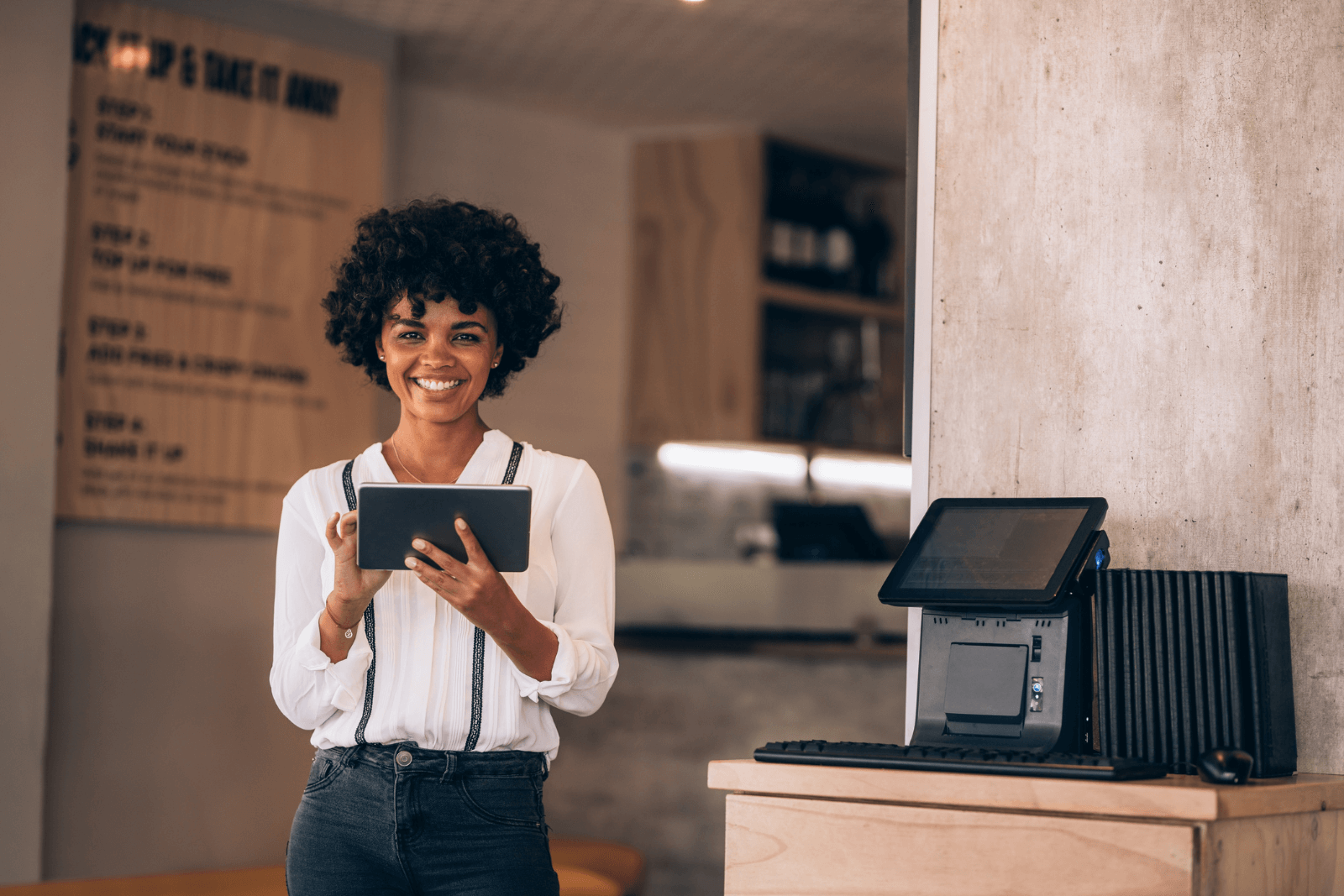Running a restaurant comes with its fair share of challenges, from attracting customers in a highly competitive market to minimizing no-shows and cancellations.
However, with the advent of digital technology, restaurant owners can leverage booking systems to tackle these obstacles effectively.
In this comprehensive guide, we will delve into the world of restaurant booking systems, exploring their benefits, functionality, and implementation.
Whether you're a seasoned restaurateur or a new player in the industry, this guide will equip you with everything you need to know about optimizing your reservation process.
Let's dive right in by defining what restaurant booking systems are.
What Is a Restaurant Booking System
A restaurant booking system is a digital solution that simplifies the reservation process for guests and restaurants.
It allows customers to book a table online whenever they want from any device.
On the other hand, restaurants are given a clear insight into all reservations, cancellations, and no-shows, which helps them manage their restaurants successfully.
How does it work?
Instead of relying on old-school methods like phone calls and pen-and-paper records, potential diners can effortlessly make reservations and secure their desired dining slots using reservation software integrated with the restaurant's website, Google, or even social media profiles.
Before the introduction of online booking systems, managing reservations during peak hours and limited working hours of the establishment posed challenges.
Moreover, it happened that some reservations were lost, not confirmed, or scribbled into a book, as seen in the photo below, and then overlooked amidst all the chaos.
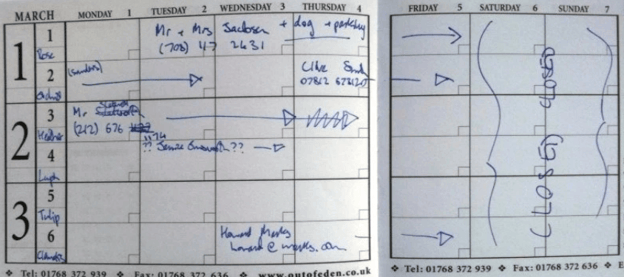
Source: Toreta
However, restaurant booking systems overcome these obstacles by operating 24/7, streamlining the entire reservation process, and making everything digital.
By eliminating the need for phone calls or in-person bookings, these systems minimize the chances of human error and efficiently manage the restaurant's seating capacity.
Instead of the chaotic mess we saw above, with reservation software, online booking systems look something like this:
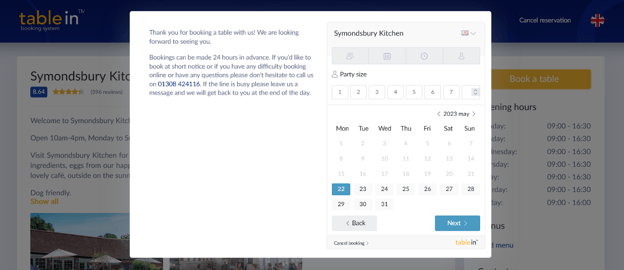
Source: Tablein
Neat, clear, and, most importantly, user-friendly and straightforward.
In the upcoming sections, we will delve deeper into the benefits of restaurant booking systems and explore how they optimize the reservation experience for customers and restaurant owners alike.
Why You Should Have a Table Booking Software
Statistics show that more and more people turn to the efficiency and simplicity of online booking.
A survey by Ask Your Target Market revealed that nearly half of the diners prefer using online platforms to make reservations instead of calling the restaurant directly.
Furthermore, 34% of respondents indicated that they are more likely to choose restaurants that offer the convenience of online reservations.
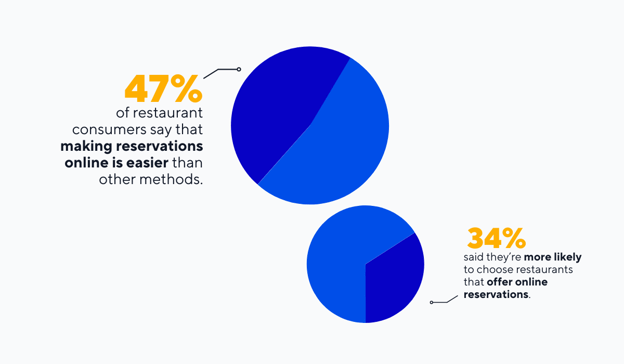
Illustration: Tablein / Data: Ask Your Target Market
These findings underscore the importance of adapting to consumer preferences by embracing online table booking.
And in the highly competitive realm of restaurants, meeting customer demands is crucial for attracting patrons.
Online reservations simplify the reservation process for potential visitors while providing numerous benefits for your business.
Integrating table booking software streamlines the entire reservation management system, from enhancing customer convenience to optimizing operational efficiency.
We will explore some of these benefits and empower you to understand why integrating table-booking software is a must-have for your restaurant.
Let’s start with maximizing table reservations.
Maximizes Table Reservations
Table booking software offers a significant advantage in maximizing table reservations for your restaurant.
There are two key reasons for that.
First, potential diners are no longer constrained by the restaurant's working hours when making reservations.
Statistics show that allowing customers to make reservations after working hours is crucial for customer success.
Notably, around 40% of people prefer scheduling appointments outside regular working hours.
This is understandable, considering people's busy schedules and daily commitments.
Here the online booking system comes in handy. The software operates 24/7, allowing guests to book tables whenever they want.
Second, there is more than just one option of how to make a reservation.
Good table booking software provides online booking options through various channels, including the restaurant's website, Google, and social media platforms.
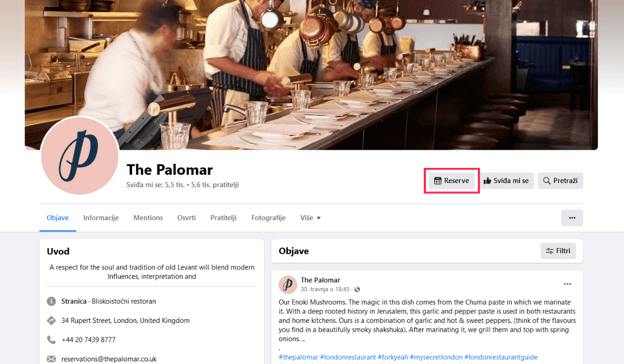
Source: The Palomar on Facebook
This accessibility plays a vital role in increasing table reservations, given that 79% of diners check a restaurant's webpage online before dining out and that approximately 80% of diners use search engines like Google to discover and select dining options.
So why not enable them to book a table then and there?
This would simplify the process for your diners, and they wouldn’t need to search for restaurants with more accessible options to make reservations.
In fact, according to a report by Seven Rooms, as many as 58% of Gen Z consumers said they would be more inclined to visit restaurants they discover on social media if they could make reservations instantly.
That’s quite a lot of potential new customers.
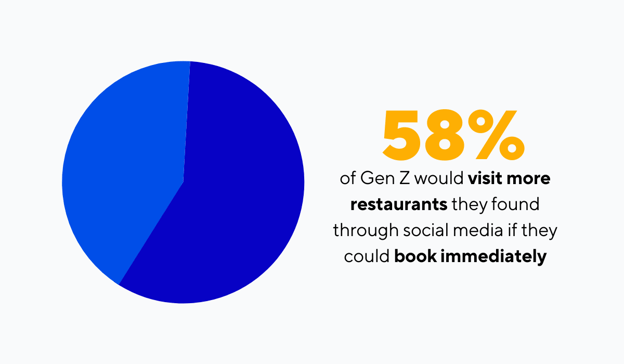
Illustration: Tablein / Data: Seven Rooms
But surprisingly, the same study revealed that nearly 59% of the UK's top restaurants do not offer reservation options through social media platforms.
Overlooking this simple step means potentially forfeiting the opportunity to tap into the spending potential of what could be the most affluent generation to date.
In conclusion, an online booking system can enable you to take reservations from your website, social media platforms, and Google.
This will attract more guests and facilitate seamless reservations, thus maximizing revenue and customer engagement.
Improves Reservation Management
Effective reservation management is vital to running a successful restaurant.
It provides a comprehensive overview of reservations, allowing you to anticipate the number of expected guests, allocate tables efficiently, and plan staff and resources accordingly.
With reliable table booking software, you can effortlessly navigate these challenges.
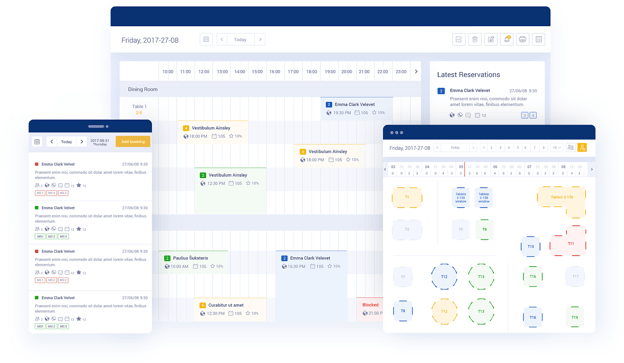
Source: Tablein
The software becomes your invaluable assistant, automating the tracking and organization of reservations and freeing up your time for other crucial tasks.
A key aspect of reservation management is optimizing table turnover, which refers to the speed and efficiency of seating and serving guests.
By carefully managing reservations, you can ensure a smooth flow of diners and maximize the utilization of available tables.
Let’s say your restaurant can seat 100 guests per night with an average dining duration of two hours.
Effective reservation management allows you to schedule and allocate tables to achieve multiple table turnovers.
This means you will accommodate more guests throughout the evening, leading to increased revenue and the overall success of your restaurant.
Optimizing table turnover is possible because the software lets you inform your diners upfront about when you expect the table back, as shown in the example below.
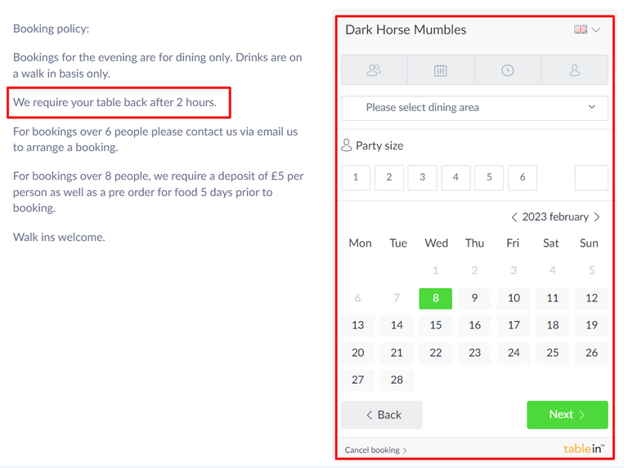
Source: Tablein
By knowing your restaurant policy from the beginning, including how much time they can spend at the table, diners will be aware of your “rules” and adhere to them.
This will increase your table turnover and allow you to serve more guests.
To summarize, by implementing robust table booking software and managing reservations, your restaurant can increase revenue, optimize table turnover, and operate seamlessly, ensuring customer satisfaction and business growth.
Reduces the Number of No-Shows
No-shows—when customers make reservations but fail to show up or inform the establishment in advance—pose a significant challenge to the success of restaurants.
Shockingly, as many as 1 in 7 reservations result in a no-show, which can be devastating to a business. After all, if a table is reserved, it cannot be offered to another patron.
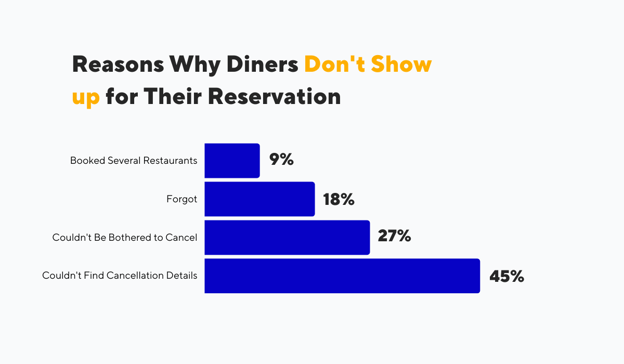
Illustration: Tablein / Data: Carbon Free Dining
Various reasons contribute to this issue, but one thing is certain: no-shows have a significant negative impact on your restaurant.
However, fear not, for a restaurant booking system comes to the rescue once again, offering a solution to tackle this problem.
By implementing a restaurant booking system, you can automatically send reservation reminders to customers, helping them remember their bookings.
Take a look at the example below, showcasing an email reminder that includes essential information such as the reservation date, time, table duration, contact details, and an option to cancel the booking.
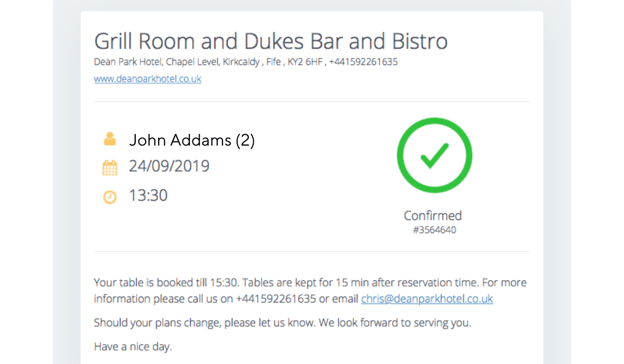
Source: Tablein
This proactive approach is practical, as 18% of consumers reported that forgetting their reservations was the reason for their absence.
With a timely reminder, this excuse becomes invalid, ensuring a better turnout.
Another approach to reducing no-shows is by implementing reservation deposits or no-show fees.
While you might initially question the willingness of customers to pay in advance, it is worth noting that an increasing number of restaurants, over 40% in the UK alone, have successfully implemented this strategy.
The key is to inform diners about the cancellation policy at the time of booking or display it prominently on your website.

Source: Maha
A crucial aspect is ensuring customers can easily access and understand the cancellation details.
As highlighted in the chart above, a staggering 45% of diners couldn’t find cancellation details and, therefore, didn’t cancel their reservations.
Overall, reliable table booking software empowers you to send reminder emails and implement deposit or no-show fee policies.
These measures significantly reduce the costs and risks associated with no-shows, allowing your restaurant to operate more efficiently and profitably.
How Much Do Restaurant Booking Systems Cost
Restaurant booking systems vary in cost based on several factors.
The price can be influenced by the features and functionality offered, the size and scale of the restaurant, and whether it's a one-time payment or a subscription-based model.
On average, restaurant booking systems can range from affordable options starting at a few dollars per month to more comprehensive solutions that may cost hundreds of dollars per month.
Some are free, like GloriaFood, for example, but naturally, they offer fewer features than others.
However, investing in a restaurant booking system is well worth considering the substantial benefits it can bring to your restaurant.
As we saw previously, restaurants can optimize table turnover rates by efficiently managing reservations, ensuring maximum capacity utilization, and minimizing empty tables.
This leads to a boost in revenue as more consumers are accommodated, enhancing the overall profitability of the business.
Moreover, a reliable booking system helps streamline operations by automating tasks such as table assignments, guest notifications, and even pre-ordering.
This saves valuable time for the restaurant staff, allowing them to focus more on providing exceptional customer service.
Also, a sound booking system will enable guests to book tables on your website, social media platforms, and Google providing them with the convenience they crave.
In summary, while the cost of a restaurant booking system may vary, its benefits make it a worthy investment for any restaurant looking to thrive in a competitive industry.
What to Look For in a Table Booking Software
We will wrap up this guide with a list of features that good booking software requires to enhance your reservation management process.
So when selecting a table booking software for your restaurant, you should consider the features we describe below.
User-Friendly Interface
Look for software with an intuitive interface that simplifies the booking process for both staff and customers.
Simplicity is important because, if the interface is overly complicated, the visitors may give up on trying to get a table, while the staff might flounder in a way that frustrates potential guests, and damages productivity.
For instance, our booking software Tablein offers a user-friendly interface for easy reservations and efficient management.
Seamless Integration
The software should integrate smoothly with your existing systems and tools, including your website, social media platforms, and Google.

Source: Tablein
Tablein allows you to integrate reservation widgets across multiple channels, ensuring a consistent booking experience.
Customizable Table and Floor Setup
Choose software that will enable you to customize table and floor setups according to your restaurant's needs.
This will not only give you a more accurate overview of the functioning of your restaurant, but it will allow you to optimize space and accommodate different party sizes efficiently.
Automation
Automation reduces no-shows, keeps guests informed, and helps manage reservations effectively.
Therefore, look for features like automatic confirmation emails and SMS, reminders, and real-time updates on table availability.
Reservation Management System
The software should provide functionalities such as table layout management, waitlist management, and a user-friendly dashboard for monitoring bookings.
Tablein offers all these features to streamline your reservation management process.
Reporting and Analytics
Gain insights into your restaurant's performance with detailed reports on reservation data, customer patterns, and relevant metrics.
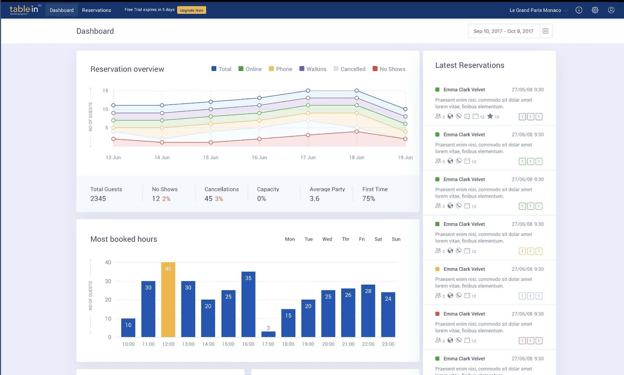
Source: Tablein
With the right analytics system, you will be able to make data-driven decisions that will optimize your operations and increase profitability.
Customer Support
Finally, ensure the software provider offers reliable customer support through live chat, email, and a knowledge base. Prompt assistance is crucial in case of any issues or questions.
To summarize, these are the features you should consider when choosing table booking software.
Our own software, Tablein, encompasses all of them, providing you with an efficient reservation management experience at an affordable price.
Conclusion
And with that, we have reached the end.
Hopefully, this guide has given you a clear understanding of restaurant booking systems’ significance and how they can positively influence your business.
When selecting the software for your restaurant, remember the advice shared in this guide.
Look for a solution that offers essential features like convenient email reminders and collecting deposit fees, as these can boost your revenue.
Furthermore, remember that excellent software should assist you in effectively managing your restaurant.
It should give you a comprehensive overview of your tables and reservations and aid in revenue forecasting and other essential aspects of restaurant management that we discussed.
By choosing a booking system with these features, you can look forward to your restaurant’s bright future.
Get a 30-day Exclusive Trial
As a Tablein blog reader, you’re eligible for an exclusive 30-day free trial to experience our simple reservation solution for your restaurant.
Enter your business email, and we’ll send you all the steps needed to create your account.
Share this
You may also like

6 Key Benefits of Having a Restaurant Reservation System

Top 7 Features a Restaurant Reservation Software Needs to Have
